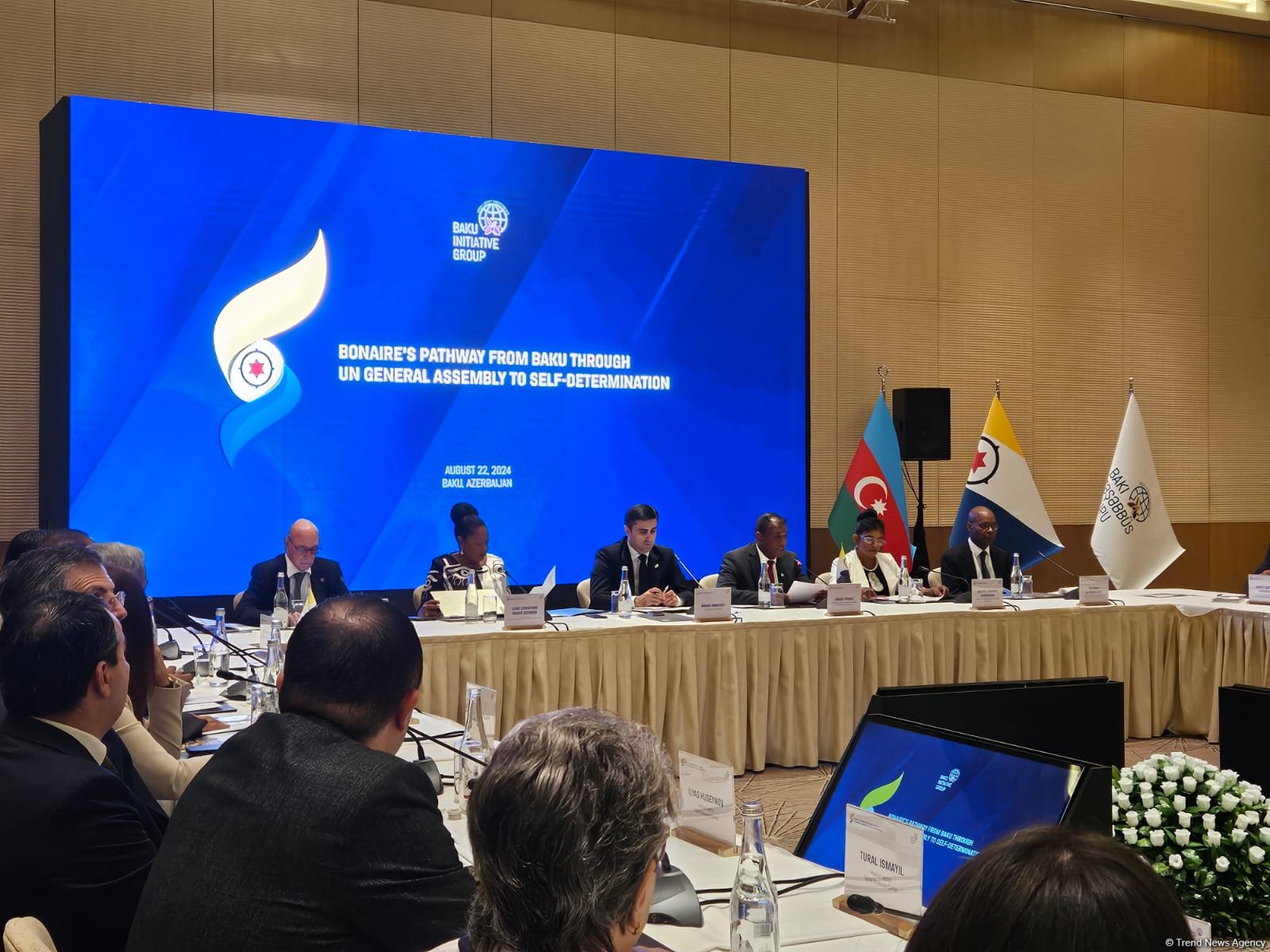BAKU, Azerbaijan, August 22. The international conference on “Bonaire’s Pathway from Baku through the UN General Assembly to Self-Determination," held in Azerbaijan by the Baku Initiative Group in collaboration with the Bonaire Human Rights Organization and Movement for Change, has concluded with the release of the final statement on Bonaire, Trend reports.
"As participants of the conference, we express our sincere gratitude to the Baku Initiative Group for the organization of the Conference and to the people of Azerbaijan for their genuine and friendly hospitality.
Dedicated to the colonized Bonaire people, the event allowed all interested parties the opportunity to exchange views on the consequences of the colonial policy of the Netherlands, which threatens the future and even the survival of the Bonaire people in the long term:
Historical Background - Bonaire's Status:
Bonaire, once a constituent state of the Netherlands Antilles, was part of a Dutch colonial entity with significant internal self-government. Following the dissolution of the Netherlands Antilles on October 10, 2010, Bonaire was unilaterally incorporated by the Dutch Government as a "public body/entity” without autonomy, entrenched in the Dutch Constitution under unequal rights.
Demographic Changes - Population Shift:
Between 2010 and 2024, Bonaire's population doubled from 11,000 to 25,000, primarily due to an influx of Dutch European immigrants. Native Bonaireans have consequently become a demographic minority and reduced in 2024 to less than 32 percent of the population on their own island.
Fight for Self-Determination - Referendum of 2015:
A referendum on December 18, 2015, saw 66 percent of voters reject Bonaire's constitutional status imposed since 2010. These results were unanimously ratified by the representatives of the island parliament as a legitimate and legal democratic decision of the people of Bonaire. The Dutch government disregarded the referendum results, maintaining the status quo.
As well as to discuss the undertaking of effective and efficient steps according to international law on the decolonization process in order to get rid of Dutch colonial oppression:
• UN Involvement:
Civil society groups in Bonaire, led by James Finies, brought their case to the UN Special Committee on Decolonization (C24) in 2016, highlighting Dutch violations of Bonaireans' rights. C24 Ambassadors recommended actions to re-list Bonaire as a Non-Self-Governing Territory and also to seek support from the regional neighbors from Caribbean and Latin American governments and initiate an independent inquiry into Bonaire's self-governance.
The participants in the conference took this opportunity to welcome the participation of the Republic of Azerbaijan at the 2024 “Caribbean regional seminar on the implementation of the Fourth International Decade for the Eradication of Colonialism, Pursuing Goals, and Addressing Needs of the Non-Self-Governing Territories," organized, on May 14–16, 2024, by the Special Committee on Decolonization in Caracas, Venezuela.
• Independent Report:
The "Assessment of the Adequacy of Self-Government in Accordance with Internationally Recognized Standards: Report of the 'Country of Bonaire'" by the Dependency Studies Project by Senior Analyst Dr. Carlyle G. Corbin United Nations expert in 2021, concluded that the 'public body/entity' imposed and renamed 'territorial public body' in Bonaire is a colonial reform of dependency governance, perpetuating inequality that is deficient through all measures of democratic governance that circumvents the inalienable right to genuine self-determination under international law. This report is endorsed and accredited by the UN General Assembly as independent, as it contains Self-Governance indicators accepted by the UN General Assembly.
• UN obligations:
Inclusion in the Non-Self-Governing Territories list would necessitate the Dutch Government's annual reporting to the General Assembly on Bonaire’s social, economic, and political progress under Article 73 of the UN Charter, Articles 1 and 55 of the Charter of the United Nations, Resolution 1514 (XV) of 1960 (United Nations Declaration of Decolonization), the International Covenant on Civil and Political Rights, the International Covenant on Economic, Social, and Cultural Rights, the International Covenant on All Forms of Racial Discrimination, and the United Nations Declaration on the Rights of Indigenous Peoples. This designation enables UN bodies to assess, intervene, and assist Bonaire as required.
• Conclusion - Call for International Support to the Resolution on Re-Registration of Bonaire as a Non-Self-Governing Territory:
Bonaire seeks backing from the international community to advocate for its re-registration as a Non-Self-Governing Territory to protect and ensure the right of the people of Bonaire to self-determination and self-government, whereas a resolution is scheduled to be submitted directly by seven (7) islands of the Caribbean under the leadership of the Prime Minister of Saint Vincent and the Grenadines and former President of CELAC, His Excellency Ralph Gonsalves to the General Assembly of the UN in early October 2024 under the agenda item of decolonization.
We appeal for solidarity and call on the UN Secretary-General and UN countries to support this noble struggle of great humanitarian significance, in the General Assembly and to join seven Caribbean islands as co-sponsors of the Resolution on the Case of Bonaire. This resolution calls for Bonaire's inclusion in the List of Non-Self-Governing Territories of the UN, placing it under the scrutiny of the UN Special Committee on Decolonization.
We, the Bonaire Peoples kindly ask H.E. Ilham Aliyev, the President of the Republic of Azerbaijan, member of the Troika of the Non-Aligned Movement, to convene the NAM countries to raise the critical issue of Bonaire's right to self-determination according to the international law on decolonization and to support its inclusion in the List of Non-Self-Governing Territories of the United Nations.
We urge the Netherlands Government to renounce its colonial policy and not to impede the re-inclusion of Bonaire in the List of Non-Self-Governing Territories of the United Nations," the statement reads.
Stay up-to-date with more news at Trend News Agency's WhatsApp channel







